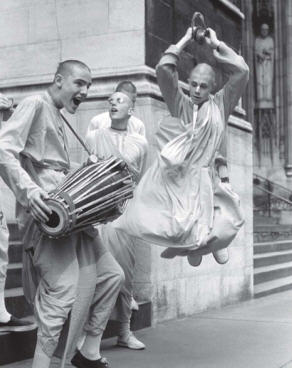How devotional practices can help you become overall healthy.

Although good health is not the ultimate aim of Krishna consciousness, it a blessing bestowed on a devotee as a result of his regulated mind and body. Good health is one of the by-products of devotion. The World Health Organization (WHO) has defined health as a state of complete physical, mental, social, and spiritual well-being. A devotee easily achieves this well-being by the power of his devotion.
Physical health
When a person constantly fails in the war with various diseases he is deemed physically unhealthy. Although the world is not Krishna conscious, it is definitely health conscious. In regards to health, I used to always contemplate how dancing kirtana can be a perfect exercise. Recently I was reading a write-up on perfect exercise. It was stated that exercise should be preceded by stretching and concluded with relaxation by lying down. The next day as I saw the devotees doing saìkirtana, I observed that the kirtana always starts with a softer note with devotees stretching themselves back and forth. Then they dance which is like an intense cardio activity. At the end, all the devotees throw themselves onto the ground to chant the prema-dhvani prayers, perfectly following the process of perfect exercise stretch, exercise, and relaxation. Apart from this, a devotee’s physical health is also guarded against all those physical ailments that arise from mental ill health and stress, as a devotee automatically achieves mental health. And, last but not least, devotional service burns all those sinful reactions to ashes which are the actual causes of all sufferings.
Mental health
When a person constantly fails in the war with his mind he is labeled as mentally unhealthy. The mind of a mentally unhealthy person is constantly wandering and fails to concentrate on any activity. Arjuna says in the Bhagavad-gita (6.34), “For the mind is restless, turbulent, obstinate and very strong, O Krishna, and to subdue it, I think, is more difficult than controlling the wind.” As a devotee chants the holy name, in the initial stages the mind wanders. Then a devotee brings it back and makes it listen to the holy name. It’s a mental exercise which a devotee performs daily for 2-3 hours. Slowly the devotee makes the mind listen to the holy name. The holy name acts on the mind and purifies it from all the contaminated desires which make the mind wild. There is no drug in this world which can purify the mind. There are blood-purifiers and body-purifiers available in the market but the holy name is the only mind-purifier. The Supreme Lord is supremely pure and He is not different from His holy name. The constant association with the holy name purifies us. A devotee also achieves perfect mental health by reading and hearing spiritual instructions from scriptures like Bhagavad-gita and Srimad-Bhagavatam.
Social Health
When a person is constantly at war with his family members, relatives, and friends he is labeled as socially unhealthy. Social health is disturbed when a person fails to adjust within society. The principle of humility and tolerance, which are the basis of the teachings of Lord Caitanya, help a devotee to lovingly adjust in this society full of quarrel and hypocrisy. Lord Caitanya instructs in His Siksastaka (3): “One should be more humble than a blade of grass and more tolerant than a tree. One should offer all respect to others and expect none in return. In such a state of mind one can chant the holy name of the Lord constantly.” Practicing such humility and tolerance, a devotee tolerates all types of people and circumstances by keeping faith in the Lord’s supreme control. Thus he never becomes the cause of disturbances in social harmony and contributes to social homeostasis. The instructive stories of the Srimad-Bhagavatam help him to live in harmony. Stories from Ramayana in which both Lord Rama and Bharata want the other to become kings serve as torchlights for destroying the nescience of social disharmony.
Spiritual Health
When a person fails in the constant war with illusion or fails to initiate a war with illusion, he is considered spiritually unhealthy. Illusion makes the person feel secure in this unsecure world full of disease and death. Illusion makes the soul forget his eternal relation with the Lord. A devotee constantly hears instructions from Bhagavad-gita (8.15) like duhkhalayam asasvatam: “This world is full of miseries and is temporary.” He never gets allured by the glare of this world, which is nothing but a reflection of the Lord’s splendor. He gives up everything that is temporary and establishes his eternal relation with the Supreme Lord Krishna. The engagement in this eternal service, which is the real instinct of the soul, makes a devotee spiritually healthy.
Thus a devotee perfectly achieves the state of complete physical, mental, social, and spiritual well-being.
Yugavatara Dasa is a lecturer in Anatomy in a medical college in Mumbai. He is a regular contributor to BTG.
